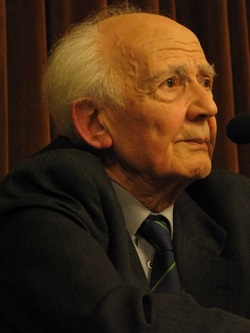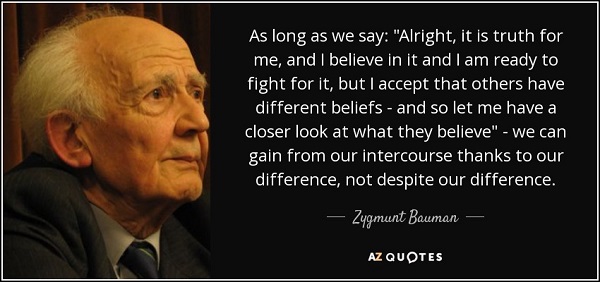Zygmunt Bauman, sociologist and philosopher, died on 9 January. He had a particular place in my life, which I’ll contextualise later. My introduction was in 1999 through his book Work, consumerism and the new poor.
 The message of the book can be simply stated. With the industrial revolution work was deemed intrinsically good, and more was better. It was preached from the pulpits. The poor had utility as a reserve workforce, to keep the cost of labour down.
The message of the book can be simply stated. With the industrial revolution work was deemed intrinsically good, and more was better. It was preached from the pulpits. The poor had utility as a reserve workforce, to keep the cost of labour down.
The modern world, however, is shaped by consumption rather than production, and production could be automated or moved offshore. So the poor no longer have any utility, they are simply defective consumers.
- The poor are not needed, and so they are unwanted. And because they are unwanted, they can be abandoned without much regret or compunction, forsaken.
In a world populated by consumers there is no room for a welfare state; the venerable legacy of industrial society looks suddenly like a ‘nanny state’, pampering the slothful, coddling the wicked, abetting the corrupt.
The poor are banished from the universe of moral empathy.
A second powerful idea concerns fluid identities within what he calls ‘liquid modernity’, the title of a book by Bauman published in 2001.
The notion is that it is difficult to form a personal identity in modern society. Capitalism provides goods and experiences to satisfy our every want, but only in a shallow manner. The idea is that we feel dissatisfied, want more or something else, and so keep consuming. Everything is temporary and subject to change.
Bauman picks up on Weber’s idea that the modern world is not genuinely concerned with ends, rather with means. The ends are decided amorphously, largely influenced by the business plans of large corporations. Our reactions in this context are emotional rather than rational. Rationality is used to rationalise and to some extent to choose means.
The BBC has a couple of quotes which are quite telling:
- People do not choose a government that will bring the market within their control; instead, the market in every way conditions governments to bring the people within its control
- In a world of global dependencies, with no corresponding global polity and few tools of global justice, the rich of the world are free to pursue their own interests while paying no attention to the rest
With Neal Lawson I grieve Bauman’s parting. However 91 years is an excellent innings, and he was sharp and productive to the end. Unlike Lawson I didn’t see Bauman as a beacon of hope, as generally speaking he did not give ‘answers’ or venture into what should be.
Clearly, though, growing inequality, the emergence of an elite group of very rich people, and the lack of constraint on the modern transnational corporation are problems which Bauman analyses with sharp skills. German sociologist Wolfgang Streeck in his book How Will Capitalism End? proposed the primacy of the nation state.
There is much of interest in Streeck’s analysis, but he probably goes too far. Back in 2003 George Monbiot put forth his vision of world government in his book The Age of Consent: A manifesto for a new world order. Of course, that just gave ammunition to right-wing groups fearing a leftwing conspiracy to establish world government.
At the time ‘globalisation’ was rampant and the nation state was in retreat. Now the nation state appears resurgent, but shows no signs of domesticating transnational corporations. Incidentally, Ian McAuley has an excellent article on globalisation, Trump, Brexit and the Lucky Country at John Menadue’s blog.
To put my introduction to Zygmunt Bauman into context, during my Bachelor of Arts degree in the early 1960s I had done a couple of years of philosophy, the equivalent of four semesters now. Later in the 1970s and early 1980s I completed a Bachelor of Education, a graduate degree, that is entry level was the possession of a degree, with studies in philosophy, sociology, management and psychology. So I knew about everything important except politics, right? Well, a bit at least.
Then after leaving the Education Department in 1991 I concentrated on learning how to be a share investor in whatever time I had over from working in people’s gardens. In 1999 my son Mark gave me for my birthday a slim book by Bauman, his Work, consumerism and the new poor. It started me on a new search for meaning in the capitalist world.
Here is an obituary from The Guardian and Bauman’s Wikipedia entry. I mentioned Bauman just over a year ago in Happiness is…, and linked to this page, where you can find more by following the illegible blue links. There is also a Bauman Institute at the University of Leeds.
I’ll finish with this quote:


Excellent Quote.
Bauman grew up through difficult times and had many lives. It is that passage that (from my shallow reading of him) tempered his Marxist beginnings, as global population multiplied three fold through his intellectual life, into a balanced and rational understanding of people and their struggles.
In light of current Israeli maneuverings I certainly appreciate his 2011 perspective…
In a 2011 interview in the Polish weekly, “Polityka”, Bauman criticized Zionism and Israel, saying Israel was not interested in peace and that it was “taking advantage of the Holocaust to legitimize unconscionable acts”. He compared the Israeli West Bank barrier to the walls of the Warsaw Ghetto where hundreds of thousands of Jews had died in the Holocaust. The Israeli ambassador to Warsaw, Zvi Bar, called Bauman’s comments “half truths” and “groundless generalizations.
Calling it what it is, we need more Zygmunt Baumans.
Without having any idea this Chap existed, when does he believe inequity, Capitalism and globalisation started ?
According to bilb he wasn’t real good with history or facts either.
20% of the Israeli population are Arabs and all Women can vote.
Jumpy, first question, don’t know.
I think he’s more reliable on facts than the Israeli ambassador.